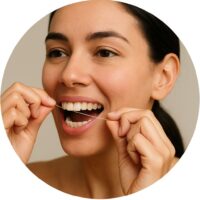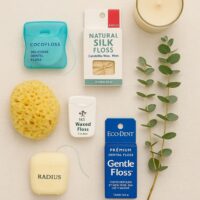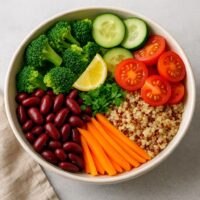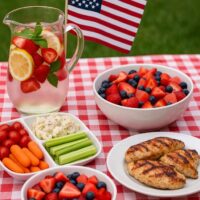Flossing Beyond the Gums
We all know we should floss—but it turns out this simple daily habit might do more than just protect your smile. More and more research suggests that healthy gums are connected to heart, brain, and blood sugar health.
- Oral-Systemic Health Connection
The mouth is not an isolated ecosystem. Chronic gum inflammation (periodontitis) caused by plaque and bacteria can allow harmful microbes and inflammatory cytokines to enter the bloodstream, triggering systemic inflammation.
- Heart Disease: Multiple studies have found a link between gum disease and a higher risk of atherosclerosis (plaque buildup in arteries). Inflammation from gum disease may contribute to the thickening of arterial walls. Also:
- A study in Clinical Oral Investigations found periodontitis is associated with a 1.14–1.20x increased risk of cardiovascular disease.
- The American Heart Association has stated that although a direct causal link hasn’t been proven, there is strong associative evidence between periodontal disease and heart conditions.
- The more frequently people flossed, the lower their risk of stroke. This dose-dependent relationship remained regardless of people’s brushing habits or regularity with the dentist.
- Compared to people who flossed more frequently, people who flossed less frequently had increased levels of C-reactive protein (CRP), a marker of inflammation—and a key factor in the development of heart disease.

- Diabetes
Poor oral health can worsen blood sugar control, while elevated blood sugar can increase the risk of gum disease—a vicious cycle. Flossing helps reduce inflammation, making glycemic control easier in those with or at risk for type 2 diabetes.
- Cognitive Health
Some studies suggest a connection between gum disease and cognitive decline, including Alzheimer’s. Chronic inflammation and bacterial infiltration (e.g., Porphyromonas gingivalis) may play a role in neurodegeneration.
- A 2019 study published in Science Advances found evidence of gingipains, toxic enzymes from P. gingivalis, in the brains of Alzheimer’s patients.
🦷 Why Flossing Works
Flossing:
- Disrupts biofilm that toothbrushes can’t reach.
- Reduces gum inflammation and bleeding.
- Helps prevent periodontal pockets (spaces where bacteria thrive).
- Lowers total body bacterial load and inflammatory mediators.
It’s worth noting that consistency matters more than perfect technique—daily flossing, even if imperfect, shows benefits.
The Hidden Issue: What’s In Your Floss?
Here’s some information that I found surprising and only recently discovered: some common flosses (like Oral-B Glide) are made with PTFE (a type of Teflon) and may contain PFAS, also known as “forever chemicals.” These substances don’t break down in the body and have been linked to hormonal disruption, immune suppression, and even cancer.
It’s a bit ironic to floss for your health while unknowingly exposing yourself to something harmful.
When I think about how many decades I’ve been flossing with regular waxed dental floss, it’s a wonder I’m still around to write about it.
Choosing a Safer Floss 
If you feel inclined to make the switch, look for floss that’s:
- PFAS-free
- Made from natural fibers like silk or nylon without chemical coatings
- Coated in plant-based waxes like beeswax or candelilla
Clean Floss Favorites:
✅ 365 by Whole Foods Market Mint Waxed Floss
Affordable, PFAS-free, and coated with beeswax and xylitol. A great everyday option.
✅ Cocofloss
Made from coconut fibers, with plant-based wax and essential oils. Grippy and PFAS-free.
✅ Dr. Tung’s Smart Floss
Expands during use for better cleaning. Coated in natural wax and flavor, PFAS-free.
✅ Radius Natural Silk Floss
Biodegradable silk with candelilla wax. Plastic-free, though not vegan.
✅ Eco-Dent GentleFloss
Nylon-based, vegan waxed, and cruelty-free. Strong, effective, and eco-conscious.
A Note on PFAS and Priorities
PFAS are found in all kinds of household items, from nonstick pans to waterproof jackets. Choosing a PFAS-free floss can help reduce exposure—but let’s keep it real: flossing consistently, even with conventional floss, is far better than not flossing at all. If a cleaner option fits your lifestyle, great. If not, just keep flossing.
Your gums—and your whole body—will thank you.
To Your Health,
Health Coach Carol
“When they mention great little things in life, they usually forget flossing.”—Scott Simon








